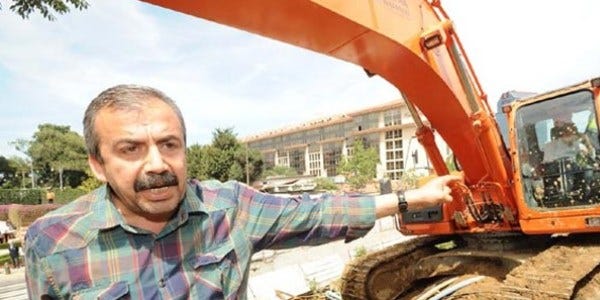Remembering Sırrı Süreyya; comments on my book; Sam Bankman-Fried and crypto in Turkey; the crackdown on İstanbul; Turkish TV psychology
Notebook #22
This is a regular feature wherein I write about the things I’ve been reading, watching, and thinking about. The first (or second sometimes) item is free, the rest is for paid subscribers only.
I haven’t been very disciplined about it, but from now on, I’ll publish a Notebook post every Sunday.
Sırrı Süreyya Önder passed away
I’m a bit late to this, but the great thinker, artist and politician, Sırrı Süreyya Önder, passed away on May 3. He was leading negotiations between the left-Kurdish DEM and the state during his last months.
He was a man of the left if there has ever been one. Given that the peace process has worked out, Önder was embraced by the entire political spectrum after his passing. This compounded the conflicting feelings a lot of people had on the Turkish left.
Sırrı Süreyya was born to a socialist family and threw himself into the cause from an early age. He first got arrested at the age of 16 for protesting the Maraş massacre. Two years later, he was arrested for opposing the 1980 coup, and in 2018, and 2020, he went to jail because he was an MP in the HDP and supported the peace process. There was rarely a time in Sırrı Süreyya’s life when one could go to jail in Turkey and he didn’t.
He was known for his ferocious intellect and sharp wit. He could cite a lot of history and poetry from memory and he let people know it too. He was without a doubt, one of the brightest politicians in Turkey’s recent history.
He wasn’t Kurdish, yet was at the forefront of left-Kurdish politics. He was one of the very few Turks who actually learned some Kurdish. As such, he devoted most of his political career to resolving the Kurdish issue. It was him who read Öcalan’s Nevruz letter in 2015, and him again who went to jail alongside Selahattin Demirtaş when that peace process went south.
I think he was pretty tired towards the end of his life. His health was giving out, and his resistance took on a more reserved tone. Still, when released from jail, the HDP convinced him to become an MP once again, and he reluctantly agreed. As a senior member of parliament, he presided over many sessions. I think that the AK Party preferred him over the CHP, which gained some momentum after the 2023 election. It appears that Sırrı Süreyya was highly involved in the deal between the state and the PKK, which ended in the latter’s dissolution. After his death, the palace chose to commemorate him as a genuinely popular figure, rather than a terrorist sympathizer.
I don’t think most of the people who loved and supported Sırrı Süreyya will remember him for these latest negotiations though. I think they’ll remember him standing in front of the bulldozers at Gezi Park in 2013. They’ll remember him for the YouTube compilation of zingers, or as Tanıl Bora wrote last week, they’ll remember him for his glorious Anatolian accent, coming through on the wings of a slightly raspy, masculine voice. As a fellow linguaphile, I just have to quote his piece on this point:
… just like Neşet Ertaş’s—Sırrı Süreyya’s accent, his way of speaking, wasn’t about dialect per se. It wasn’t a sign of ignorance or crudeness, nor a performance of authenticity... it wasn’t the Adıyaman dialect, nor specifically from here or there… His was an accent that declared he wasn’t taken in by the official tongues of the oppressor, the arrogant, the powerful; a dialect that challenged them. It carried the carefree air of someone without wealth to perch on, the easy conscience of someone who hadn’t wronged anyone, the expansiveness of “one day the tables will turn,” the sarcasm of “you go ahead and amuse yourself.” It was an accent that—through a different intonation, a different pronunciation, a different voice—seemed to point the ear toward another possibility, something different altogether...
If you’re curious about Sırrı Süreyya’s artistic work, below is the trailer to his best-known film, Beynelmilel [The Internationale], with English subtitles. He wrote and directed the whole thing. It’s an account of the 1980 coup that’s distantly based on Sırrı Süreyya’s own experiences. He also acts in it, and if I remember correctly, he plays the small business owner who’s instinctively right-wing, so the AK Party role. I watched it in the theater back in 2006, when it first came out. I think a re-watching is overdue in the next weeks.
Googling around, I also found this workshop with Columbia University where Sırrı Süreyya talks about the film.
Notes on New Turkey and the Far Right
wrote up a piece recently in which he talked about my book, New Turkey and the Far Right: How Reactionary Nationalism Remade a Country. I’ve long admired his work as a journalist and thinker, so I was very excited that he found the book to be valuable. My goal in writing the book was to describe the Erdoğan revolution (or revaluation rather, if you’ve read the book) as closely and dispassionately as possible. Now, I don’t support Erdoğan’s politics, but I’ve always wanted to describe it in a way that someone from the other side of the argument would also agree to my characterization of it. That’s what I wanted for this book as well. I wanted it to be readable on both sides of Erdoğan, if you will.
Murtaza comes out with that type of post-liberal reading, which was very exciting to me. He’s a keen observer of global politics, with a focus on the Muslim world, and he sees the core dilemma in the Erdoğan project: geopolitical success at the expense of domestic life. Here’s the argument in a nutshell:
Turkish elites have also engaged in ruthless devaluation of liberal norms that they see as weakening the national body. These have included procedural democracy, individual freedom, and human rights, all of which have been portrayed by Turkish leaders as delusional liberal fantasies unsuited for a serious civilization. As Koru writes, Turkish Islamists have instead dedicated their energies towards fostering social conservatism, religious revival, deployment of military force abroad, strategic use of soft power, and the fostering of state-connected industries intended to be used as sources of direct power for the regime.
In theory, these policies should produce a tightly-organized national body focused on self-strengthening, population growth, economic prosperity, and defense against external enemies. But ideas and reality don’t often match up very cleanly. Turkey’s birthrate continues to rapidly decline, inflation has left ordinary citizens in deep discontent, many urbanized youth are actually very secular, and the periodic purges required to maintain the loyalty of state institutions have deprived Turkey of the talents of many of its most vital citizens.
Despite the partly botched implementation, if liberalism, which has been reduced to a cult belief in the developing world, and is in deep crisis in its Western heartlands, is really expiring, it’s not clear Turkish Islamists have the wrong idea about how to organize a state. Their ideas have uncomfortable resonances with the historical far-right as Koru notes, which is rightly blamed for bringing Europe to disaster in the last century. But in a jungle-like world where there are no rules or institutions towards which the weak can appeal, focusing on maximizing collective strength at all costs may actually be a pragmatic decision. It certainly sounds more appealing than suffering the fate of weak peoples like the Armenians of Nagorno Karabakh, or the Palestinians of Gaza, who have appealed to the world to stop their massacres and displacement on moral grounds, without the slightest response. It is better to have weapons, territory, and a large national economy, rather than counting on the United Nations to rescue you.
You can find the piece here:
Keep reading with a 7-day free trial
Subscribe to Kültürkampf to keep reading this post and get 7 days of free access to the full post archives.




